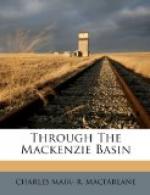Tepees were to be seen in all directions from our camp—the lodges of the Indians and half-breeds. But no sooner was the treaty site apparent than a general concentration took place, and we were speedily surrounded by a bustling crowd, putting up trading tents and shacks, dancing booths, eating-places, etc., so that with the motley crowd, including a large number of women and children, and a swarm of dogs such as we never dreamt of, amounting in a short space by constant accessions to over a thousand, we were in the heart of life and movement and noise.
Mr. Ross, as already stated, had gone on by trail from Edmonton, partly in order to inspect it, and managed to reach the lake before us, which was fortunate, since Indians and half-breeds had collected in large numbers, and women thus able to allay their irritation and to distribute rations pending the arrival of the other members of the Commission. During the previous winter, upon the circulation in the North of the news of the coming treaty, discussion was rife, and every cabin and tepee rang with argument. The wiseacre was not absent, of course, and agitators had been at work for some time endeavouring to jaundice the minds of the people—half-breeds, it was said, from Edmonton, who had been vitiated by contact with a low class of white men there—and, therefore, nothing was as yet positively known as to the temper and views of the Indians. But whatever evil effect these tamperings might have had upon them, it was felt that a plain statement of the proposals of the Government would speedily dissipate it, and that, when placed before them in Mr. Laird’s customary kind and lucid manner, they would be accepted by both Indians and half-breeds as the best obtainable, and as conducing in all respects to their truest and most permanent interests.




